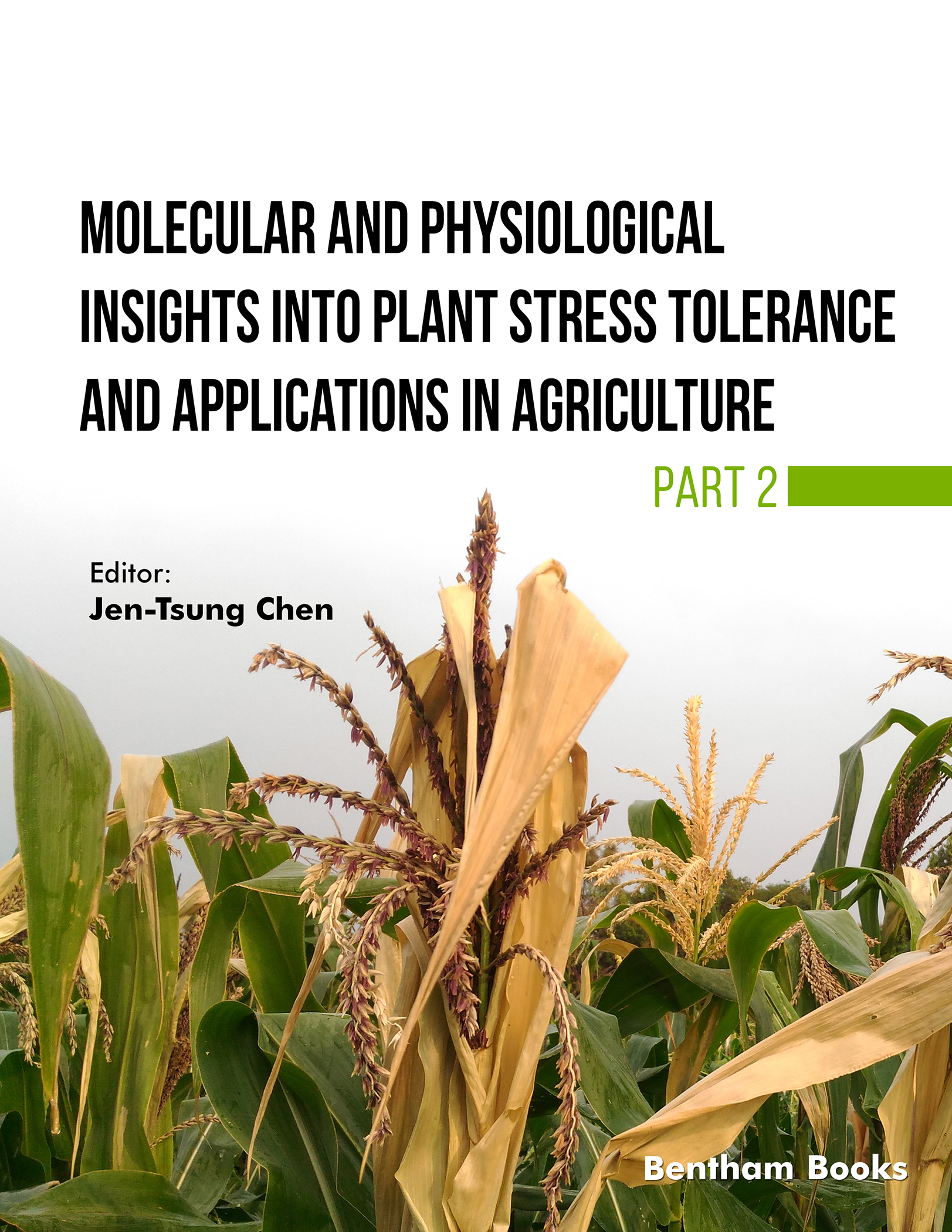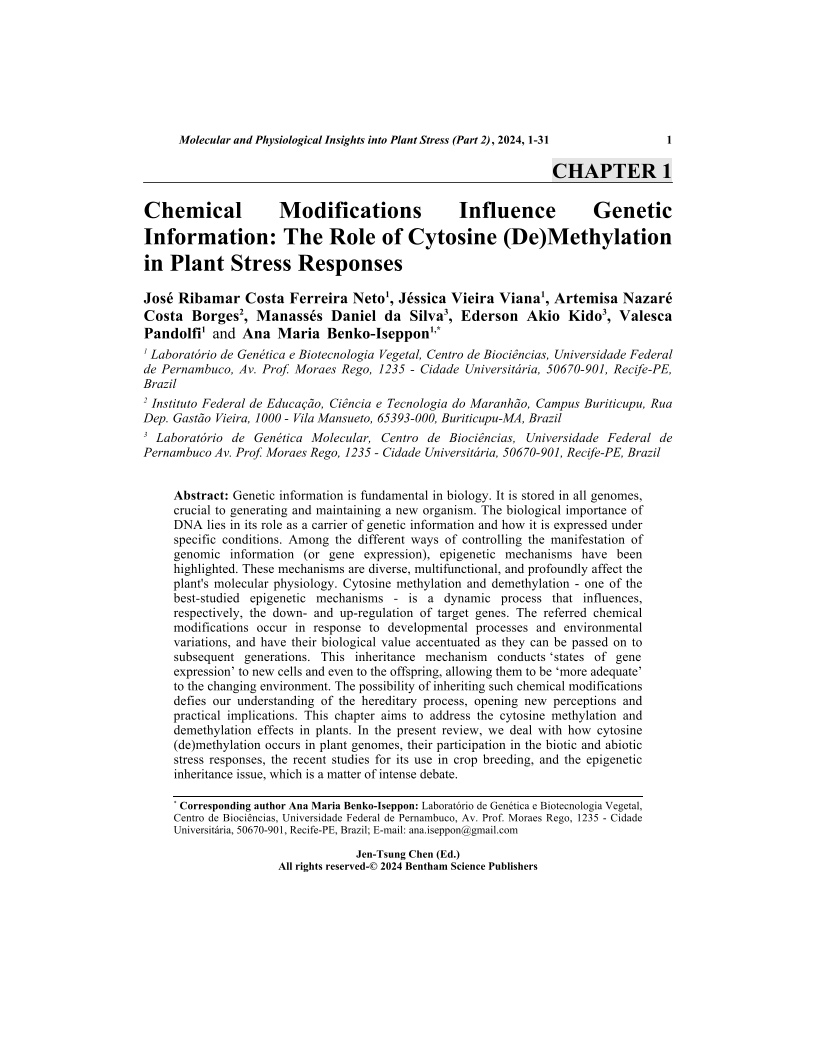Chemical Modifications Influence Genetic Information: The Role of Cytosine (De)Methylation in Plant Stress Responses

- Authors: Jos Ribamar Costa Ferreira Neto1, Jéssica Vieira Viana2, Artemisa Nazaré Costa Borges3, Manassés Daniel da Silva4, Ederson Akio Kido5, Valesca Pandolf6, Ana Maria Benko-Iseppon7
-
View Affiliations Hide Affiliations1 Laboratrio de Gentica e Biotecnologia Vegetal, Centro de Biocincias, Universidade Federal de Pernambuco, Av. Prof. Moraes Rego, 1235 Cidade Universitria, 50670-901, Recife-PE, Brazil 2 Laboratrio de Gentica e Biotecnologia Vegetal, Centro de Biocincias, Universidade Federal de Pernambuco, Av. Prof. Moraes Rego, 1235 - Cidade Universitria, 50670-901, Recife-PE, Brazil 3 Instituto Federal de Educao, Cincia e Tecnologia do Maranho, Campus Buriticupu, Rua Dep. Gasto Vieira, 1000 - Vila Mansueto, 65393-000, Buriticupu-MA, Brazil 4 Laboratrio de Gentica Molecular, Centro de Biocincias, Universidade Federal de Pernambuco Av. Prof. Moraes Rego, 1235 - Cidade Universitria, 50670-901, Recife-PE, Brazil 5 Laboratrio de Gentica Molecular, Centro de Biocincias, Universidade Federal de Pernambuco Av. Prof. Moraes Rego, 1235 - Cidade Universitria, 50670-901, Recife-PE, Brazil 6 Laboratrio de Gentica e Biotecnologia Vegetal, Centro de Biocincias, Universidade Federal de Pernambuco, Av. Prof. Moraes Rego, 1235 - Cidade Universitria, 50670-901, Recife-PE, Brazil 7 Laboratrio de Gentica e Biotecnologia Vegetal, Centro de Biocincias, Universidade Federal de Pernambuco, Av. Prof. Moraes Rego, 1235 - Cidade Universitria, 50670-901, Recife-PE, Brazil
- Source: Molecular and Physiological Insights into Plant Stress Tolerance and Applications in Agriculture- Part 2 , pp 1-31
- Publication Date: February 2024
- Language: English
Chemical Modifications Influence Genetic Information: The Role of Cytosine (De)Methylation in Plant Stress Responses, Page 1 of 1
< Previous page | Next page > /docserver/preview/fulltext/9789815179699/chapter-1-1.gif
Genetic information is fundamental in biology. It is stored in all genomes, crucial to generating and maintaining a new organism. The biological importance of DNA lies in its role as a carrier of genetic information and how it is expressed under specific conditions. Among the different ways of controlling the manifestation of genomic information (or gene expression), epigenetic mechanisms have been highlighted. These mechanisms are diverse, multifunctional, and profoundly affect the plant's molecular physiology. Cytosine methylation and demethylation - one of the best-studied epigenetic mechanisms - is a dynamic process that influences, respectively, the down- and up-regulation of target genes. The referred chemical modifications occur in response to developmental processes and environmental variations, and have their biological value accentuated as they can be passed on to subsequent generations. This inheritance mechanism conducts states of gene expression' to new cells and even to the offspring, allowing them to be more adequate' to the changing environment. The possibility of inheriting such chemical modifications defies our understanding of the hereditary process, opening new perceptions and practical implications. This chapter aims to address the cytosine methylation and demethylation effects in plants. In the present review, we deal with how cytosine (de)methylation occurs in plant genomes, their participation in the biotic and abiotic stress responses, the recent studies for its use in crop breeding, and the epigenetic inheritance issue, which is a matter of intense debate.
-
From This Site
/content/books/9789815179699.chapter-1dcterms_subject,pub_keyword-contentType:Journal -contentType:Figure -contentType:Table -contentType:SupplementaryData105

